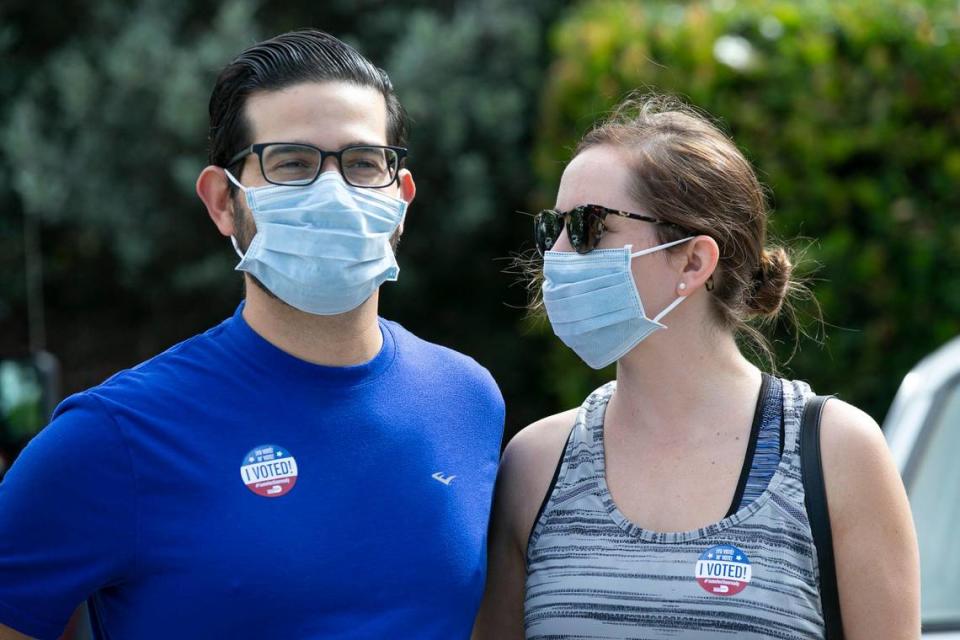Politics and policy in the age of COVID-19, lock down and distancing
What does it mean to take seriously the threat of being infected by a virus that has caused a global pandemic?
That question would hardly have seemed relevant six months ago but, here we are, and it is not only on the minds of every Floridian but it is one that appears to have answers as diverse as the state itself.
For Agriculture Commissioner Nikki Fried and several Democratic leaders, it means it’s time for the governor to order sheltering in place or close all non-essential businesses as governors in 11 states have done. But Gov. Ron DeSantis has rejected those suggestions. He has been much more cautious, refraining from using his executive powers to order a statewide restriction on people moving about.
Despite that, one by one, communities across Florida announced measures to limit people’s movements as officials try to curb the spread of the coronavirus before the number of very sick people overwhelm hospitals and the healthcare industry.
Even within the governor’s party, the approach to the coronavirus is starkly different. Senate President Bill Galvano warned of an “overreaction.” House Speaker Jose Oliva asked: “At what point is the cure worse than the virus? We are all deeply concerned but should we all be deathly afraid?”
Then there is Jacksonville Mayor Lenny Curry, the former chairman of the Florida Republican Party, who tweeted on Friday: “the data is clear. Social distancing is the answer. And it’s not casual distancing. We must isolate ourselves to our families to the extent we can.”
Should I stay or should I go? At the state level, the governor has rejected calls to impose a statewide lock down as businesses scramble to stay afloat in the blistering uncertainty of the pandemic. The results were apparent over the weekend as people flocked to beaches and boat parties across the state.
As the governor refrained, many cities and counties in the hardest hit areas issued curfews, restricting residents — with certain exceptions — from being outside during late night and early morning hours, they include: Broward, Orange and Osceola counties, Palm Beach, Miami Beach, North Miami Beach, Key Biscayne, and Sunny Isles Beach.
Fevers and spikes: Meanwhile, a company that uses Internet-connected thermometers to track the spread of flu has seen a spike in what it considers ‘atypical illness’ across Florida and suspects it’s a sign that the novel coronavirus is potentially spreading faster than state health officials and the U.S. Centers for Disease Control and Prevention is reporting it.
New data: The state on Saturday began reporting the number of COVID-19 cases by community, an important step in the transparency needed to help people stop the spread of the contagious virus. But still missing from the state’s public records release is the number of hospitalizations in each community. Why is that important? Because epidemiologists say it can take 2-4 weeks before an infection reaches the point of hospital care.
Jobless crash: The novel coronavirus pandemic is testing Florida’s unemployment assistance program, already stingy and unreliable. As Florida’s economy ground to a halt this week, Floridians flooded the program with calls and online requests, jamming up the phone lines and crashing the website.

Approaching storm: The Florida Legislature ended its work last week with a two-and-a-half-hour budget session on Thursday that ended with passage of the $93.2 billion budget. Normally, that would be big news, and we’d be dissecting all the last-minute goodies tucked skillfully into the conference report. Instead, we have spent the week consumed by COVID-19 like an approaching storm, attending daily briefings at the emergency operations center, tracking data and developments. which have overshadowed everything.
What changed: Eight senators and 12 House members didn’t show, almost nobody shook hands and when the sergeants did the sine die hanky drop, they kept their distance.
All lawmakers were screened for symptoms of the virus by one of their own in a conference room off the Speaker’s office. Galleries were closed to the public. Staff asked all who entered the building about their travel history and if they had experienced any respiratory distress before they were allowed to pass. But all the planned social distancing practices suggested — such as keeping the voting board open so that members didn’t congregate were jettisoned. It was mostly business as usual.
Closeness not distance: Jacksonville Mayor Lenny Curry announced he will start virtual press conferences via video conferencing on Monday. By contrast, DeSantis, has touted the importance of social distancing but has required reporters to appear in person at his press conferences if they want to question him. Appeals by editors at several newspapers went unanswered.
ELECTION SURPRISES Primary day proceeded without disruptions for the most part as Joe Biden beat Bernie Sanders soundly, taking most the state’s 219 pledged delegates and moving closer to the Democratic presidential nomination. But there were some election day surprises.
Biden’s Hispanic support: Exit polls and precinct-based analysis from the Arizona and Florida primary elections show Joe Biden performed better among Latino and Hispanic voters than he did in previous states like Nevada and California.
VBM surge: Election Day turnout in Florida was down significantly from 2016, as a lack of a competitive GOP primary, surging vote-by-mail totals and the coronavirus all kept voters away from the polls on Tuesday. But the total number of votes in the Democratic primary between former Vice President Joe Biden and Vermont Sen. Bernie Sanders beat 2016 numbers as Florida Democrats voted by mail in record numbers.
No paywall: The Miami Herald and McClatchy news sites have lifted the paywall for all stories related to the coronavirus. To support vital reporting such as this, please consider a subscription for unlimited digital access.
Know someone who’d like to get this? Send this to a friend to receive our weekly newsletter on politics and policy in the nation’s most important battleground state.

